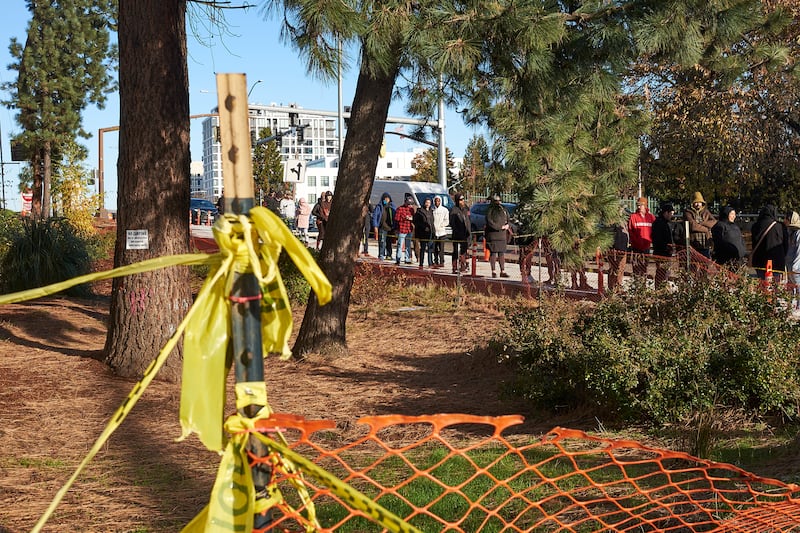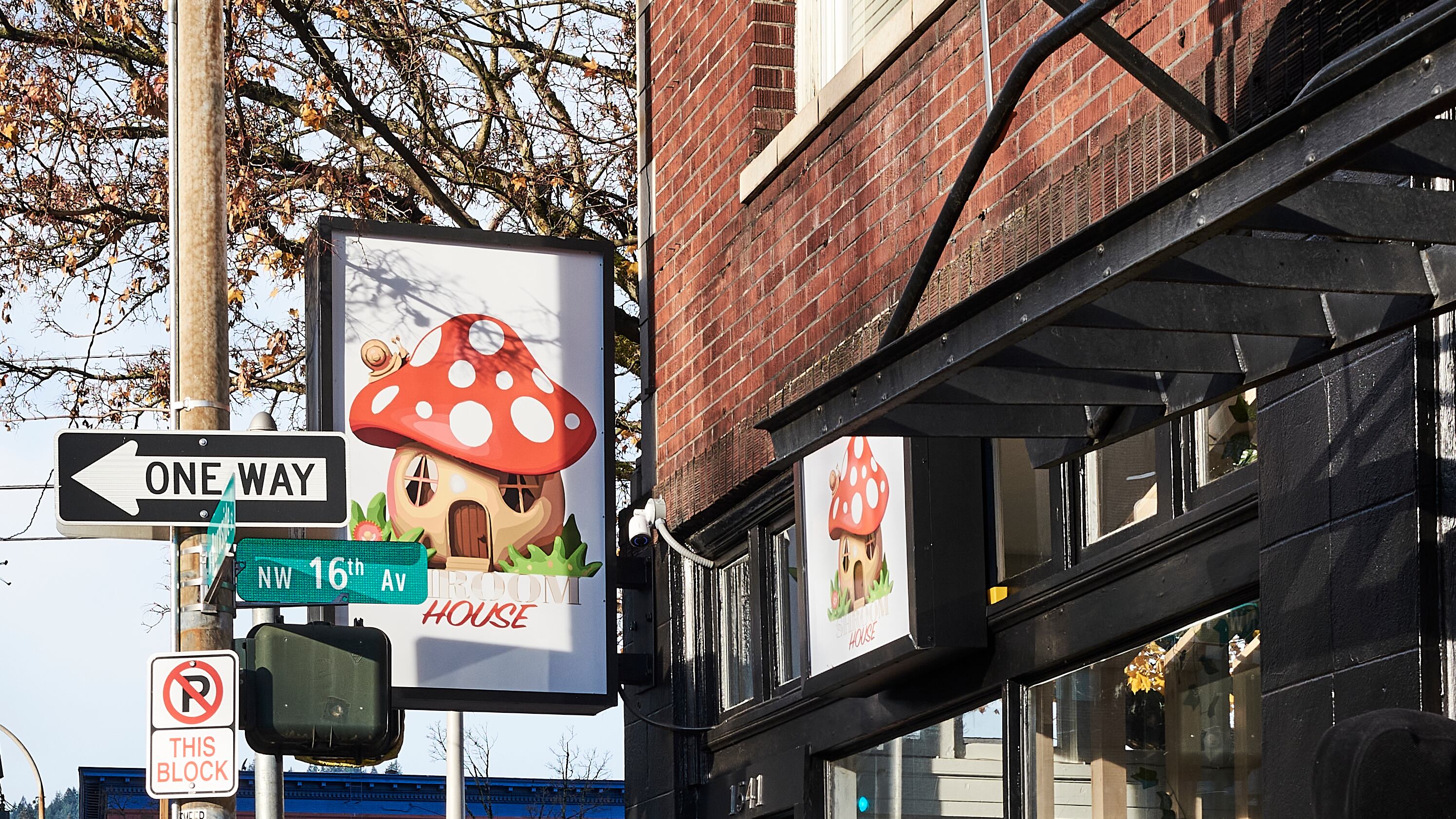The biggest attraction in Portland this holiday season has been a shop selling psychedelic mushrooms, at retail, on West Burnside Street at 16th Avenue, a block from the Crystal Ballroom.
Shroom House is hard to miss. It has seven signs, including a billboard across the street, all showing a cartoon cottage, its roof formed by a red and white mushroom cap. At most hours, it also has a line stretching a block east along the sidewalk.
Since Dec. 1, when a WW reporter strolled in, bought 7 grams of “Penis Envy” fungi, and wrote about it, Shroom House has been mobbed. The wait on Saturday stretched to five hours, as customers queued along Burnside seeking enlightenment, an appointment with God, or just a good time.
Shroom House announced its Oct. 24 grand opening on Twitter. In a Christmas miracle, it’s been undisturbed since, despite violating federal drug laws and a list of voter-approved Oregon statutes on psilocybin.
Mike Arnold, an Oregon criminal defense lawyer who has his own—legal—psilocybin business that operates in Jamaica, says the owners of Shroom House are risking many months in prison, depending how much product they have on hand and whether prosecutors charge by the transaction.
“This is some serious exposure,” Arnold says. “If I were their lawyer, I’d be telling them to run for the hills and count their blessings.”
Buyers face prosecution, too, depending on their purchases. Shroom House sells portions ranging from 3.5 grams to 14 grams. Walk out of the Shroom House with anything more than 12 grams, and you’re committing a misdemeanor.
And that might not even be the worst consequence of a visit to Shroom House. The business has been accumulating a detailed database of customer information, including two forms of ID, one of which can be a credit card. Employees have been unable, or perhaps unwilling, to put WW in contact with the owner.
State Sen. Elizabeth Steiner (D-Portland), who campaigned for the legalization of psilocybin in therapeutic settings, is aghast at the brashness of the retail store.
“This is like someone opening a cocaine store on Burnside,” Steiner tells WW.
As of press deadline at 4 pm Dec. 6, the shop was still slinging Penis Envy the way Voodoo Doughnut sells penis-shaped pastries.
Oregon has some of the most permissive psilocybin laws in the nation—though they don’t permit the owner of the Shroom House to sell psychoactive fungi like ice cream.
Measure 109, passed in 2020, made it legal for adults to use mushrooms on the premises of a certified “service center” under the supervision of a facilitator who guides users through their trips. Both the service centers and the facilitators must be approved by the state—and, so far, none has been, according to the Oregon Health Authority, which administers the psilocybin licensing program.
Neither Measure 109, nor Measure 110, which decriminalized possession of up to 12 grams of mushrooms, made retail sales legal in any way, shape or form.
Ownership of Shroom House is murky. Clerks, some with Buddha-like smiles, wouldn’t say who controls it. Former employees were paid by a company called “Alive N Well Hospitality Group LLC,” according to KOIN-TV. A limited liability company by that name was created in April by Steven Tony Tachie, state records show.
Tachie, who has lived in Atlanta and Canada, released several hip-hop songs under the name Young Sleezy in the early 2010s, according to a website run by one of his producers, DJ Hunt.
Property records show the space is owned by Sunjoy Realty LLC, which, in turn, is managed by Carla Byrum, who, along with her husband, Mark, owns a number of restaurants around town, including Brix Tavern, Bartini, Urban Fondue and the Taylor Street Tavern. “Unfortunately, I am unable to comment at this time,” Mark Byrum says, “due to legality reasons.”
Tachie didn’t respond to messages to his various social media accounts, and staff at the Shroom House wouldn’t talk strategy. That means industry players like Arnold are left to guess at the owner’s endgame. He may be looking to make a quick buck, Arnold says, betting that Oregon’s softer stance on psilocybin will give him breathing room, the way cannabis laws did for pot sellers before recreational sales became legal in 2014.
Shroom House has a sister store in Vancouver, B.C. (same cutesy logo). The woman answering the phone there said the shops shared the same owner but wouldn’t say who it was. Shroom House is one of at least four shops in Vancouver pursuing a gambit of “don’t ask for permission, ask for forgiveness,” according to the Canadian Broadcasting Corp.
So far, that’s working here, too. Law enforcement agencies have pointed fingers at each other. The U.S. Drug Enforcement Administration deferred to “local law enforcement partners,” which it said were investigating. Mayor Ted Wheeler had no comment and deferred to the Portland Police Bureau, which last week referred reporters to the Oregon Health Authority. OHA, in turn, said it was “a matter for local or state law enforcement.”
The only elected official who has spoken out loudly against Shroom House so far is Sen. Steiner. A doctor by trade, she was among the biggest supporters of Measure 109 because she believes psilocybin has great promise to treat things like severe depression, alcohol abuse, and post-traumatic stress disorder.
Research at Harvard and Johns Hopkins universities supports all of that, and it may be part of the reason that Shroom House is pulling Portland customers faster than a Sleater-Kinney reunion tour.
Hobbit-cute though it may seem, the Shroom House is a clear and present danger to Measure 109. Part of the law it created gives counties and towns the right to opt out and prohibit psilocybin centers from operating. Twenty-five counties did in last month’s election.
“A lot of places opted out because they were terrified about things like this,” Steiner says.
Letting a retail store sell a Schedule I prohibited drug—even one with great therapeutic promise—sends a bad message, Steiner says.
“It’s ludicrous,” she says. “This is entirely a law enforcement issue.”
Even the San Francisco Bay Area, equally blighted by homeless camps, graffiti, trash, and smash-and-grab thieves, has taken action against illegal psilocybin sales.
In 2020, the Oakland Police Department raided the Zide Door Church of Entheogenic Plants and seized $200,000 in cash, cannabis and shrooms, according to Vice News. The Oakland City Council had voted to decriminalize hallucinogenic fungi the year before.
Earlier this month, San Francisco police raided a shop that appeared to be openly selling shrooms in Haight Ashbury, the OG acid haven. “A large quantity of suspected narcotics was seized,” a spokesman for the department said. The owner was charged with violating the California Health & Safety Code.
So far, it’s crickets from the cops in Portland, mostly. Last year, police booked Nicholas Manfredi for possessing psilocybin. He was charged with a misdemeanor and sentenced to 18 months’ probation. Manfredi is the only person to face psilocybin-related charges since Measure 110 went into effect, a spokeswoman for the Multnomah County District Attorney’s Office tells WW.
Like Fight Club, the Shroom House has its own code of conduct. In addition to personal information, which it keeps on file to make future purchases easier (clerks say), a customer must apply to become a member of the “Shroom House Society.”
“The Society Board will consider your application at which time it will be rejected or accepted,” the application says. Though it sounds like Skull and Bones at Yale, or a really exclusive Elks Club, a reporter for WW had his application accepted within minutes. And none of these steps makes selling psychedelic mushrooms at retail any more legal.
Many Shroom House customers don’t see a downside, even after turning over personal information and a credit card to an illegal enterprise.
“It’s just balls out,” said Matt Kidder, 42, who braved Sunday’s snowstorm to shop after a couple of beers watching football. “I think the guy who did this is a genius. The city of Portland has plenty of other things to worry about than me microdosing some mushrooms.”



